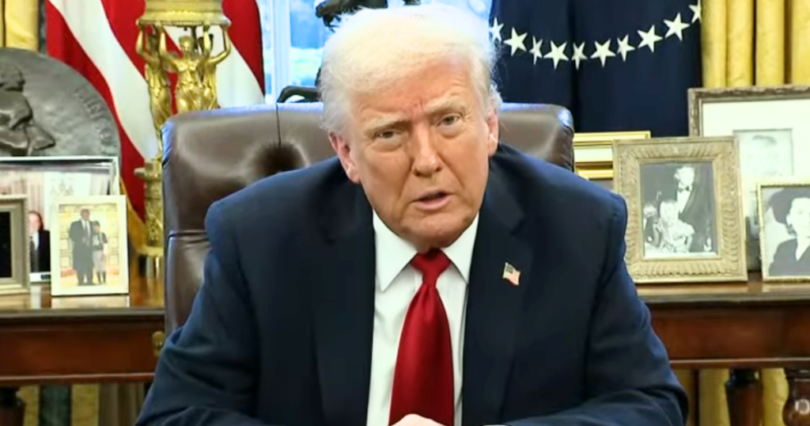Trump Imposes 25% Tariff on Foreign Cars, Aiming to Boost US Manufacturing
In an effort to strengthen American manufacturing, President Donald Trump announced that he would be enacting a 25 percent tariff on all foreign-made cars. The tariff, set to take effect on April 2, applies to vehicles from both allied and adversarial nations.
“What we’re gonna be doing is a 25 percent tariff on all cars that are not made in the United States,” Trump stated during an Oval Office address, according to the Daily Mail.
🚨BREAKING: Trump just announced a 25% tariff on all foreign made vehicles!
Why do you think these auto manufacturers have been making mad dashes back to America?
AMERICA FIRST!
pic.twitter.com/hTP83cQJWH— Gunther Eagleman™ (@GuntherEagleman) March 26, 2025
He asserted that the move would drive business back to the country, adding, “Business is coming back to the United States.”
The president is also signing an executive order to support the auto industry, claiming it will help it “flourish like never before.” He dismissed concerns that the tariffs would lead to price increases for American consumers, insisting that “we’re going to have the best economy ever.”
Brian Pannebecker, retired auto worker and 25-year UAW member praises @POTUS’ tariffs on foreign cars:
“The people in Macomb County and the Detroit area want work… So, we welcome this — tariffs are going to be an excellent thing for the auto industry here in the United States.” pic.twitter.com/3H75XlR5YD
— Rapid Response 47 (@RapidResponse47) March 26, 2025
Economic analysts have projected significant price hikes for consumers as a result of the tariffs. The Anderson Economic Group predicts that vehicles built in the U.S. but requiring foreign parts could see price increases ranging from $3,500 to $12,000.
The automotive industry, which has long relied on international supply chains, could face disruptions. Many lower-priced cars are assembled in Mexico, while various parts for American-made vehicles come from Canada.
The Chevy Blazer, for example, is assembled in Mexico and could be impacted, as could the Honda HR-V. Vehicles manufactured in Detroit, Ohio and Indiana may also see cost increases due to reliance on foreign components, the Daily Mail reports.
Financial markets reacted to the tariff announcement with declines. The S&P 500 dropped about 1 percent, while the NASDAQ fell 2 percent by the close of trading.
Shares of major automakers also fluctuated—General Motors stock declined by 3 percent, Stellantis fell 3.6 percent, while Ford’s stock saw a slight uptick.
Trump dismissed concerns about the market reaction.
“I didn’t see that,” he said. “I want to see the jobs.”
“That’ll all take care of itself.”
Attn BMW & all foreign car makers: You are more than welcome to open your auto plants in Missouri
You don't want to pay 25% tariffs? Come on over—our door is open! pic.twitter.com/hNfIQYon0A
— Josh Hawley (@HawleyMO) March 27, 2025
Earlier this month, Stellantis, Ford and General Motors successfully lobbied the administration to exclude Canada and Mexico from a separate 25 percent tariff on imported goods. However, the new car tariff’s impact on trade partners remains uncertain.
Canadian Prime Minister Mark Carney criticized the move, calling it an attack on Canadian workers. The status of potential exemptions for other nations remains unknown.
Trump was asked whether Tesla, whose CEO Elon Musk is a White House advisor, would benefit from the new policy. The president responded that Musk had not been involved in the decision, though he called Tesla “fantastic.”
“I think they may, it could be a net neutral, or they may be good. He has a big plant in Texas,” Trump said.
President Trump’s new 25% tariff on foreign cars will affect Tesla too. Elon Musk confirmed the hit, but he’s never asked Trump for any favors. Instead, he’s doubling down on U.S. production with plans to double Tesla’s output in 2 years. pic.twitter.com/S0ysHtB7qz
— DogeDesigner (@cb_doge) March 27, 2025
The president estimated that the tariffs could generate between $600 billion and $1 trillion in revenue over a “relatively short-term period.” The tariffs will be collected at ports of entry and applied to imported vehicles.
Despite concerns about economic disruption, Trump stood firm on the decision.
“This is permanent,” he stated, while Commerce Secretary Howard Lutnick noted that the tariffs would officially take effect on April 3.
“If they have factories here, they’re thrilled. If you don’t have factories here, they’re going to have to get going and build them,” Trump said.
The auto tariffs follow Trump’s decision last month to impose a 25 percent tariff on steel and aluminum imports, a move that also drew international backlash.
Scroll down to leave a comment and share your thoughts.


Leave a Comment